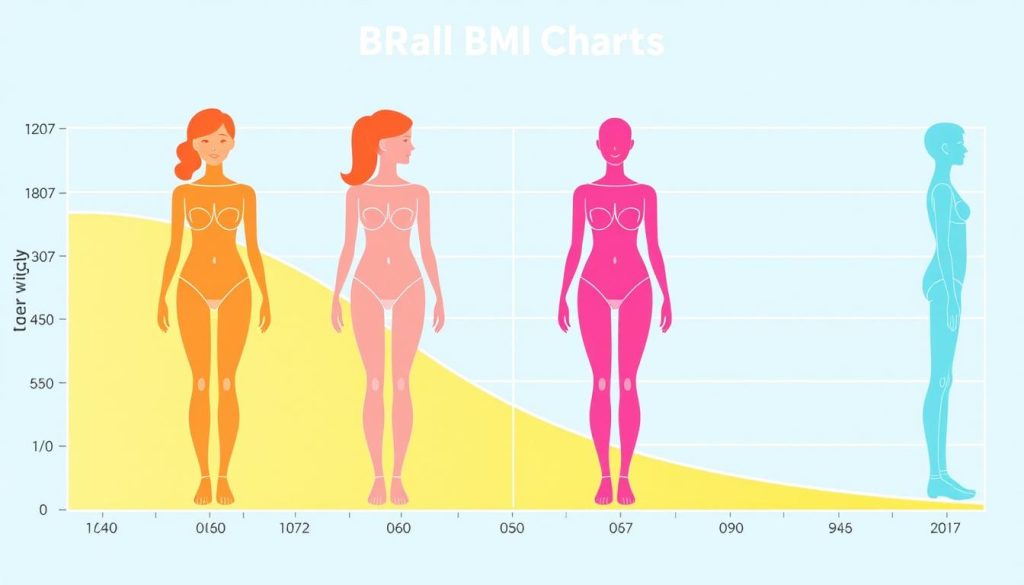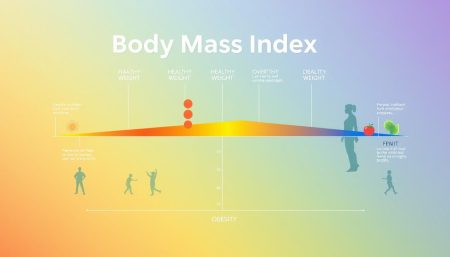Starting to understand what is a normal body mass index (BMI) is a key step towards better health. Doctors use BMI to check if someone is at a healthy weight range. This helps predict health and prevent diseases. Remember, a ‘normal’ BMI can vary for everyone, depending on several factors.
BMI is a big indicator of health risks and helps start early treatments. To understand your BMI, use a detailed BMI chart. It helps you see where you stand on the health scale.
Key Takeaways
- Understanding BMI is crucial for gauging personal health status.
- A normal BMI differs among individuals, emphasizing the need for a tailored health assessment.
- Regularly consulting a BMI chart can aid in tracking changes in your healthy weight range.
- BMI is a helpful tool, yet it’s one of many factors in evaluating overall well-being.
- Interpreting BMI requires a nuanced approach, taking into account individual health profiles.
Understanding Body Mass Index (BMI)
Learning about what is a normal body mass index is key to managing health. The Body Mass Index (BMI) is a tool doctors use to check weight status and health risks.
Definition of BMI
BMI is a number that shows how weight relates to height. It helps sort people into underweight, normal, overweight, and obese categories. This can affect health.
Importance of BMI Measurements
BMI measurements are vital for health care. They help spot health problems early. This guides steps to improve body composition and lifestyle.
How BMI is Calculated
The BMI formula is simple. It divides weight in kilograms by height in meters squared. This tells if someone is at a healthy weight, which is important for health:
| Weight Status | BMI (kg/m²) |
|---|---|
| Underweight | |
| Normal weight | 18.5 – 24.9 |
| Overweight | 25 – 29.9 |
| Obese | 30 or greater |
Knowing and using the BMI formula is a good start for checking body composition. But, it might not work perfectly for athletes or those with different body fat distributions.
Ranges of Body Mass Index
Understanding the Body Mass Index (BMI) categories is key to knowing your health and weight status. The BMI chart helps by showing clear divisions from underweight to obesity. We’ll look at these categories closely, focusing on what’s considered an ideal weight.
Underweight Category
A BMI under 18.5 means you might be underweight. This could be due to not eating enough, health problems, or genetics. Being too thin can lead to nutrient deficiencies and a weaker immune system.
Normal Weight Category
Having a BMI between 18.5 and 24.9 is considered normal. This range is seen as the ideal weight. It supports good health and lowers the risk of chronic diseases linked to higher or lower BMIs.
Overweight and Obesity Categories
People with a BMI of 25 to 29.9 are considered overweight. A BMI of 30 or more is classified as obesity. Obesity raises the risk of heart disease, diabetes, and high blood pressure.
Using a BMI chart is vital for understanding your health and weight. It’s a great tool for planning lifestyle changes. But, remember, BMI doesn’t account for muscle or fat, so it might not be accurate for athletes or those with denser bodies. Always talk to a healthcare professional for a more accurate view.
Factors Influencing BMI
It’s important to know what affects Body Mass Index (BMI). Things like age, gender, ethnicity, and lifestyle play big roles. They change how we see BMI and what’s considered normal.
Age and Gender Differences
Age and gender are key to understanding body changes. Women usually have more body fat than men, which can change BMI scores. As we get older, we lose muscle, which can also affect BMI.
Ethnicity Considerations
People from different ethnic groups have different body types. For example, Asians might have more body fat at a lower BMI than others. This means we need to adjust BMI formulas to be fair for everyone.
Lifestyle and Activity Levels
Our lifestyle and how active we are also impact BMI. Being active can build muscle, which can raise BMI but improve health. On the other hand, not being active can lead to more fat, lowering BMI scores.

Health Implications of BMI
Knowing what a normal body mass index (BMI) is key. It shows risks that can harm our health a lot. Understanding how BMI extremes affect us highlights the need for a balanced diet and lifestyle.
Risks Associated with Low BMI
A BMI below the healthy range poses serious health risks. These include malnutrition, weaker immune system, and osteoporosis. In extreme cases, it can even lead to organ failure.
People with low BMI often feel very tired. They also get sick more easily. This greatly affects their life quality.
Risks Associated with High BMI
On the other hand, a high BMI increases the risk of chronic diseases. This includes type 2 diabetes, high blood pressure, heart disease, and some cancers. Staying within the healthy BMI range helps prevent these conditions.
This is important for our health and the healthcare system too.
The Relationship between BMI and Chronic Diseases
There’s a strong link between BMI and chronic diseases. A high BMI often leads to metabolic syndromes. These include high blood pressure, high blood sugar, and abnormal cholesterol levels.
These conditions are early signs of serious health problems.
| BMI Category | Associated Risks |
|---|---|
| Underweight (<18.5 BMI) | Malnutrition, osteoporosis, decreased immune function |
| Normal (18.5-24.9 BMI) | Lower risk of chronic diseases |
| Overweight (25-29.9 BMI) | Increased risk of chronic diseases like type 2 diabetes |
| Obese (30+ BMI) | High risk of hypertension, cardiovascular diseases |
Alternatives to BMI for Assessing Health
The body mass index (BMI) calculator is still widely used to check fitness. But, it has its limits. This leads to looking into other ways to understand body composition and health better. These methods give a clearer view of health than just weight and height.
Waist-to-Hip Ratio
The waist-to-hip ratio (WHR) is a key health indicator. It shows how fat is spread and the risk of heart disease. A lower WHR means less risk, showing the importance of belly fitness for health.
This ratio is more detailed than BMI. It focuses on belly fat, which is linked to health risks.
Body Fat Percentage
Body fat percentage directly shows how much fat you have compared to your total weight. It’s a key part of body composition analysis. You can get this through bioelectrical impedance analysis or dual-energy X-ray absorptiometry.
These methods give detailed and personalized health info.
Other Health Indicators
There are more health markers like muscle mass, bone density, and metabolic rates. These give important insights. They help in creating fitness plans and diets that fit your health needs.
| Health Metric | Benefits | Common Methods |
|---|---|---|
| Waist-to-Hip Ratio | Assesses cardiovascular risk | Measuring tape |
| Body Fat Percentage | Accurate obesity assessment | Calipers, BIA devices |
| Additional Markers (Muscle mass, Bone Density) | Comprehensive health analysis | DEXA scan, MRI |
Considering BMI’s limits in body composition, these alternatives offer a more accurate health picture. They are better for understanding health risks tied to obesity. Body composition needs detailed and advanced evaluations, making these alternatives better than relying only on BMI.
How to Maintain a Healthy BMI
Keeping a healthy Body Mass Index (BMI) is key for your health. It affects how long you live and how well you feel. This section talks about how to mix nutrition, fitness, and lifestyle changes to keep a healthy weight.

Importance of Diet and Nutrition
Eating right is crucial for managing your weight. A diet full of fruits, veggies, lean proteins, and whole grains keeps you full and controls calories. Learning about nutrition helps you make smart food choices for a healthy BMI.
Role of Physical Activity
Being active is also key for a healthy weight. Activities like walking, cycling, or strength training burn calories and build muscle. This boosts your metabolism and improves how your body looks.
Behavioral Changes for Weight Management
Changing your lifestyle is often needed for weight management. This includes setting achievable goals, keeping a food diary, and watching your portion sizes. Regular health checks and staying motivated by seeing your progress also help a lot.
By combining these strategies, you not only keep a healthy BMI but also improve your overall health and happiness. This empowers you to live a full, energetic life.
BMI in Different Populations
Understanding what is a normal body mass index (BMI) is key. It shows how BMI changes with age and growth. It’s important to look at BMI for kids, teens, adults, and seniors to get a full picture of health.
Children and Adolescents
For kids and teens, BMI is adjusted to match their growth. Doctors use a body mass index calculator that considers age and gender. This helps spot health issues early, like being too thin or too heavy.
Adults
For adults, BMI is usually the same for most people. But, muscle, bone density, and body fat matter too. These can change how BMI is seen. So, adults should get regular health checks to understand their BMI right.
Seniors
As we get older, muscle loss can make BMI seem off. For seniors, a bit higher BMI might be okay. Regular health checks are key to make sure BMI shows a true picture of health.
| Age Group | Typical BMI Range | Considerations |
|---|---|---|
| Children and Adolescents | Varies widely | Age, gender, growth patterns |
| Adults | 18.5 – 24.9 | Body composition, muscle mass |
| Seniors | Higher BMI range acceptable | Decreased muscle mass, age-related factors |
Critiques and Limitations of BMI
Many people wonder about the normal body mass index (BMI) when talking about health and fitness. It’s important to know the flaws in BMI as a health measure. This part will look at the problems with BMI, especially in measuring body composition and health.
Inaccuracy in Body Composition Measurement
BMI, or Body Mass Index, is often seen as flawed. It doesn’t tell the difference between muscle and fat. This can lead to wrong ideas about someone’s fitness and health.
For example, athletes might have a high BMI because of muscle, but they’re really healthy. On the other hand, people with a “normal” BMI might have too much fat, hiding health risks.
BMI also doesn’t consider muscle spread or bone strength, which are key to health. This makes BMI not very good at predicting someone’s health.
Cultural and Individual Variability
BMI doesn’t work well for everyone because of genetic, cultural, and ethnic differences. People with the same BMI can have very different health outcomes. This shows that a normal BMI can mean different things in different cultures, leading to wrong health advice.
Alternatives Suggested by Researchers
Researchers have come up with better ways to measure body composition and health. These methods aim to give a more complete picture of someone’s health. Here are some of these alternatives:
| Method | Description | Focus Area |
|---|---|---|
| Waist-to-Hip Ratio | Measures the waist to hip ratio to check body fat distribution. | Abdominal fat assessment |
| Body Fat Percentage | Directly measures body fat percentage compared to total body weight. | Total body composition |
| Dual-Energy X-ray Absorptiometry (DEXA) | Uses x-rays to measure bone density and body composition accurately, including muscle and fat. | Detailed body composition analysis |
These alternatives offer a deeper look into someone’s health and fitness. They consider things BMI can’t. Using these methods, doctors can give better health advice.
Conclusion: The Role of BMI in Health Awareness
Understanding what is a normal body mass index (BMI) is key for health awareness. It helps guide people towards their ideal weight. This is the first step in deeper health checks.
These checks show potential health risks. They highlight the need for weight management in overall well-being.
Summarizing Key Points
Body Mass Index is a simple yet useful health metric. It must be seen in the context of age, gender, ethnicity, and lifestyle. Its value lies in sparking further health investigations.
By looking into BMI’s details, we see its role in health. It’s just one piece of the health puzzle. This shows the need for full health checks.
The Future of BMI in Health Assessments
Health assessments are getting better with new tools and data. BMI will still be important but will be used with other indicators. This will give a clearer health picture.
New technologies like genetic markers and wearable health monitors will help. They will improve health assessments beyond just BMI.
Encouragement for Individualized Health Plans
Health plans should not just focus on BMI. We need plans that fit each person’s life. These plans should cover many health areas.
Custom health plans lead to better health outcomes. They help us understand the complex world of health better.
FAQ
Q: What exactly is Body Mass Index (BMI)?
A: BMI is a number based on weight and height. It shows if you have too much or too little body fat. It helps find weight issues that could harm your health.
Q: Why is understanding a ‘normal’ BMI important?
A: Knowing your BMI range is key. It tells you if you’re at a healthy weight or not. This info helps you make choices for a healthier life.
Q: How do you calculate BMI?
A: To find your BMI, divide your weight in kilograms by your height in meters squared. The formula is BMI = kg/m2.
Q: What are the BMI ranges for underweight, normal weight, overweight, and obesity?
A: BMI ranges are: underweight (less than 18.5), normal (18.5–24.9), overweight (25–29.9), and obese (30 or higher).
Q: How do factors like age, gender, and ethnicity affect BMI?
A: Age, gender, and ethnicity can change how body fat and muscle are distributed. This can affect your BMI. For example, women and some ethnic groups might have different body fat levels.
Q: What are the potential health risks of an abnormal BMI?
A: An abnormal BMI can lead to health problems. Low BMI might cause malnutrition and osteoporosis. High BMI increases the risk of heart disease and diabetes.
Q: Can BMI accurately measure health and body composition?
A: BMI is useful for weight categories but doesn’t measure muscle to fat ratio. It might not be accurate for very muscular people or older adults who have lost muscle.
Q: What are some alternatives to BMI for health assessment?
A: Other ways to assess health include waist-to-hip ratio, body fat percentage, and health indicators like blood pressure and cholesterol levels. These give a fuller picture of health.
Q: How can I maintain a healthy BMI?
A: For a healthy BMI, eat well, exercise regularly, and make lifestyle changes. Getting enough sleep and managing stress also help.
Q: Do children and the elderly measure BMI the same way as adults?
A: Kids and teens have BMI charts that consider their age and sex. Seniors might have adjusted BMI ranges due to age-related body changes.
Q: How is BMI evolving as a tool for health assessments?
A: BMI’s role is changing as its limits are recognized. It’s now used with other health metrics for a more accurate health check.


















